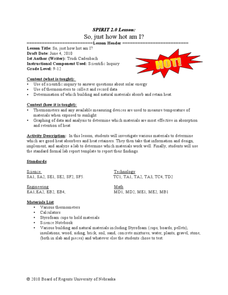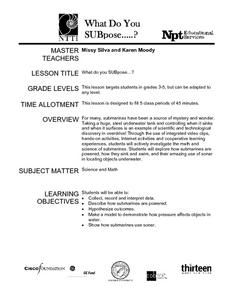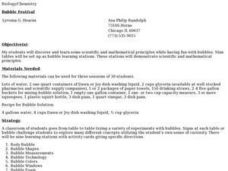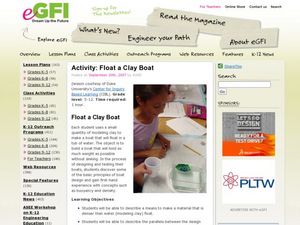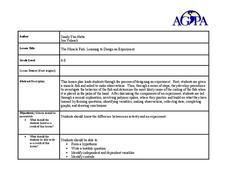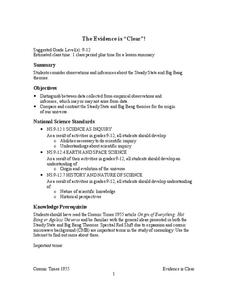Curated OER
The Economic Way of Thinking - About Everything
Students write their definitions of economics on index cards and revise them as the lesson plan continues. They discuss the principles of economic reasoning and after completing a quiz, use economic reasoning to solve "real life" mysteries.
Foundation for Water & Energy Education
What is the Water Cycle? Activity A
Hydrologists create a concept map about how water is used and a sentence strip defining water and describing its unique properties. Small groups work together to fill a small milk carton and compute the mass of water inside. The next...
Curated OER
So, just how hot am I?
Young scholars design a lab demonstrating the scientific method. In this earth science lesson, students investigate different materials for their heat absorbing property. They report their findings in class.
Curated OER
What Do You SUBpose?
Submarines are the fous of this math and science instructional activity. In it, learners explore the world of submarines: how they work, and what they are used for. They engage in hands-on activities, watch video clips, and work in...
Curated OER
Ocean Floor
Students identify ocean floor features. In this earth science lesson, students predict the object inside a close box to make them realize the difficulties scientists faced then. They label the different zones of the ocean floor after the...
Curated OER
Designing a Real Life Ecosystem!
Students research abiotic and biotic factors concerning the concept of an ecosystem. Record and analyze data collected. Write a lab report in proper and scientific format with thinking and analytical skills. Work as a cooperative team.
Curated OER
Using Java Applets for Inquiry-Based Physics Lessons
Using Java Applets in the physics classroom can be a great way to reinforce scientific concepts.
Curated OER
Introduction And Brief History of Materials Science
Learners develop an understanding of the concept of matter. They l participate actively in the bubble raft experiment as described on the Center for Thermal Spray Research's website. They demonstrate dislocations and grain...
Curated OER
Plant Life Cycle Activities and Lesson Plans
Curb spring fever by bringing some of the great outdoors into your classroom with plant life cycle activities.
Curated OER
Hello Summer
Students celebrate the great outdoors and the coming summer break by studying the natural world. In this seasons instructional activity, students engage in bark rubbing and operate a digital camera to capture outdoor imagery for a...
Curated OER
Non-Compressibility of Water
Students will observe a property of water. For this inquiry-based properties of air lesson, students observe how a change in water pressure impacts the positioning of an eye-dropper in the water container and they make hypotheses about...
Curated OER
Fun Activities Using Seeds
Students analyze the size, shape, and form of several different seeds. In this all about seeds lesson plan, students complete four activities involving characteristics of seeds. Students observe the seeds, record information about the...
Curated OER
Seed Germination
Students explore the process of seed germination. In this botany lesson, students complete an experiment with seeds. Students observe soaked and dry seeds. Students allow the seeds to germinate and make observations during this time....
Curated OER
Bubble Festival
Young scholars practice scientific inquiry while learning about bubbles. In this lesson about bubbles, students explore characteristics of bubbles. Young scholars move through nine different "bubble" stations following directions and...
Curated OER
You Can Die Here – Death Valley California
Students use Google Maps to explore the rain shadow desert. In this climate lesson, students use the Internet, Google Maps, and directed inquiry worksheets to understand how rain shadow deserts form. Students apply climate concepts to...
Curated OER
Activity: Float a Clay Boat
Written to introduce pupils to buoyancy, this activity has collaborative groups work to design a floatable clay boat. They first observe that a stick of clay sinks in water and then are given their own stick to reshape into a floating...
NASA
Tools to Study Tornadoes and Galaxies
Take your class on an intergalactic journey as they explore the galaxy and various meteorological events taking place in our atmosphere each day. Learners investigate electromagnetic waves and the Doppler Effect before gathering radar...
University of Colorado
Is There Life on Earth?
To find life on another planet, scientists look for gases (atmosphere), water, and temperatures that are not extreme. In this activity, groups of pupils become "Titan-ians," scientists who want to explore Earth for possible life forms....
University of Colorado
Are All Asteroids' Surfaces the Same Age?
There are more than 600,000 asteroids in our solar system. Pupils analyze images of two asteroids in order to determine if they are the same age. They count craters for each asteroid and compare numbers.
NASA
Supernova Chemistry
By measuring the wavelength, frequency, and intensity of electromagnetic radiation, scientists determine the temperature, density, and composition of far away items. Scholars rotate through ten lab stations using a spectroscope at each...
Curated OER
The Miracle Fish: Learning to Design an Experiment
Learners develop procedures to explore the behavior of fish. In this scientific experiment lesson students from a hypothesis, write a question, identify different variables and controls in their experiment.
NASA
Discovering Some of Your “Yardsticks” Are Actually “Meter-sticks”
The Milky Way gets great reviews on Trip Advisor — 100 million stars. The activity allows scholars to rethink their assumptions and prior knowledge. Pupils observe a set of two lights at equal distance and brightness, but they believe...
NASA
The Evidence is “Clear”!
Do you think you know better? Become a scientist and prove it. Scholars review the evidence for two different theories of the origins of the universe. They notice the empirical observations as well as the inferences to determine which is...
Curated OER
Exploring Big Bang Evidence
Ninth graders study the Big Bang theory. In this big bang theory lesson students research the Internet and complete several activities and create a presentation.
Other popular searches
- Inquiry Based Science Lessons
- Life Science Inquiry Lessons
- Inquiry Science Lessons
- Inquiry Based Science Lessons




